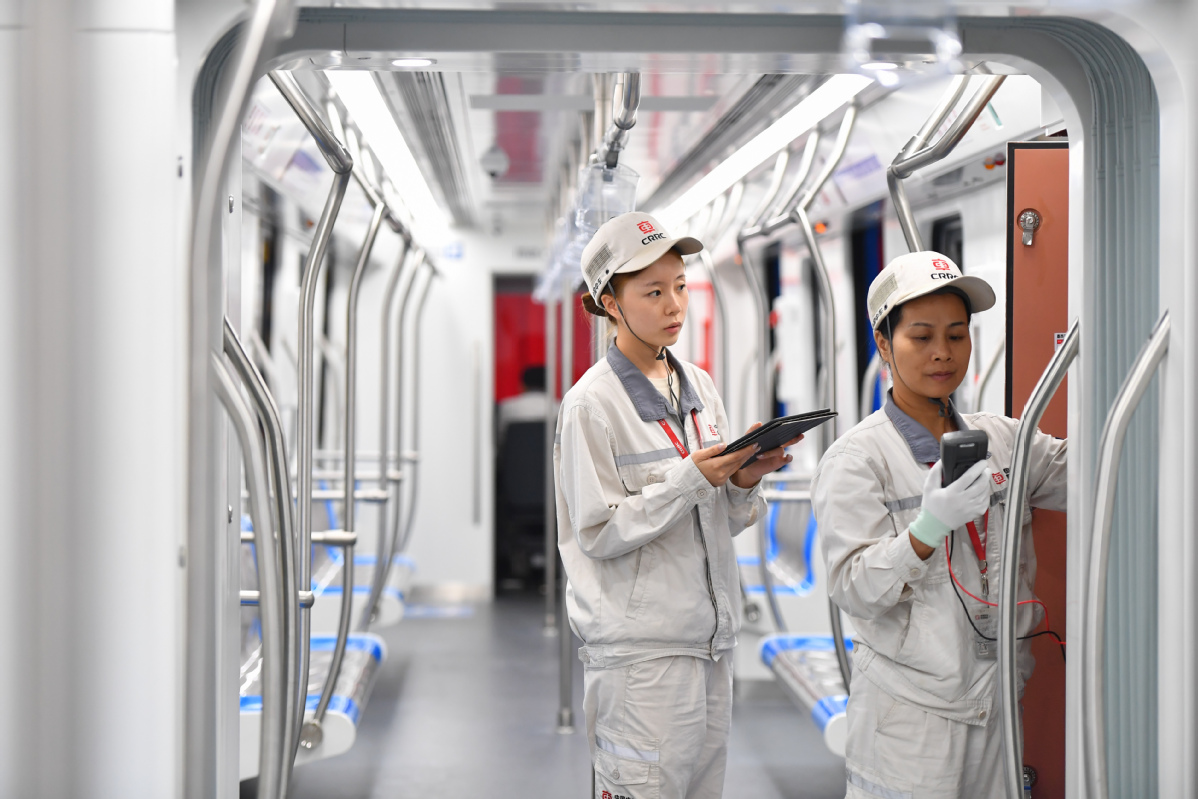BRI projects altering dynamics of global trade


Infrastructure and business activities fostering synergy in development strategies among partner economies
A railroad between China and Laos, a vehicle plant in South Africa, a container port in Greece and a highway in Jamaica — these represent just a few of the projects constructed and managed as part of the Belt and Road Initiative over the past decade.
They have not only contributed to the economic advancement of the recipient countries, but have also fundamentally altered the dynamics of global trade.
Goods, services and cross-border investment can be better delivered and provided across the world through a large number of BRI-related infrastructure and business activities, thus fostering synergy in development strategies among the partner economies.
This trend has been evident at Suzhou JDI Electronics Inc, a manufacturer of liquid crystal display monitors and semiconductors based in Jiangsu province.
In a workshop, a team of workers is busy packing LCD monitors destined for export to Indonesia.
Together with the benefits generated by the Regional Comprehensive Economic Partnership, the company is aiming to export more products to BRI markets, particularly to member countries of the Association of Southeast Asian Nations.
"Since the RCEP officially took effect in Indonesia at the beginning of this year, it has brought positive developments for our company's exports to the Southeast Asian country. Our products are now included in the tariff reduction list, leading to a substantial decrease in the tariff rate from 5 percent to zero," said Luo Wei, head of the company's Customs clearance management unit.
Early last month, Suzhou JDI Electronics submitted an application to local Customs for an RCEP Certificate of Origin for a shipment that includes LCD products, with a total value exceeding 1.5 million yuan ($209,418). This entitles the company to a tariff discount of 80,000 yuan.
"Under the RCEP rules, when determining the origin of goods, the free trade area can be regarded as a whole," said Luo.
Due to its competitive edge in international markets, the company is confident about exporting its products to other countries, he added.
About 12,900 kilometers away from Suzhou, engineers from Mexico and CRRC Zhuzhou Locomotive Co, a subsidiary of State-owned CRRC Corp Ltd, are monitoring the first section of Metro Line 1 of Mexico City. The line was overhauled and upgraded, and then resumed operations at the end of October.
The metro line is now equipped with a communication-based train control system, which offers more precise train control, better service reliability and increased route capacity, said Wang Qiaolin, general manager of Hunan province-based CRRC Zhuzhou.
To seize more market opportunities brought on by the BRI, CRRC Zhuzhou built a factory in Mexico City to manufacture trains.
Supported by more than 100 local suppliers, 15 trains had been produced by the end of October. The plant has also trained nearly 300 technicians and created 1,500 jobs for the local community.

New growth drivers
Over the past 10 years, the BRI has developed into a popular international public good and cooperation platform that adds new growth drivers to the global economy.
Foreign trade between China and participating economies surpassed $21 trillion from 2013 to October 2023, while China's direct investment in BRI economies topped $270 billion, data released by the National Development and Reform Commission showed.
The strengthened business connections among economies participating in the BRI will play a crucial role in addressing issues such as unbalanced growth and deficiencies in economic governance, said Zhang Yongjun, deputy chief economist at the China Center for International Economic Exchanges in Beijing.
"This is a developmental concept, a collaborative platform and a market network established to foster mutual growth," said Wang Wen, executive dean of Renmin University of China's Chongyang Institute for Financial Studies.
The initiative not only leverages the strengths of emerging economies, but also fosters dialogue and exchanges between developed and developing countries, consolidating and balancing the traditional and new forces of global development, he added.
According to a document released by China's Office of the Leading Group for Promoting the Belt and Road Initiative, in the next decade, all parties will be encouraged to strive toward equal cooperation and mutual benefit, propelling Belt and Road cooperation into a new phase characterized by high-quality development.
Calling for active participation in BRI cooperation in various fields, Hungarian Minister of Foreign Affairs and Trade Peter Szijjarto said the economies of the East and the West are interdependent, and those who fail to recognize this are driven by ideology rather than facts.
Decoupling and severing ties are highly detrimental and may lead to significant economic risks. Such an approach puts millions of jobs at risk and threatens global economic growth, said Szijjarto.
Highlighting that three of the top 10 global electric vehicle manufacturers have factories in Hungary, he said that Hungary's strategy is aimed at fostering interconnectedness to ensure its success under the tangible growth of the BRI.
EBANX, a Brazilian payment solutions provider operating in 29 countries, said it will allocate more resources in both China and economies participating in the BRI to sustain robust growth.
Supported by over 800 employees, the Curitiba-based company has expanded into new markets in Latin America, Africa and Asia, including 22 countries involved in the BRI. It plans to collaborate with more Chinese businesses to tap into the growth potential within emerging markets participating in the BRI.
"This strategic alignment emphasizes our commitment to focusing on emerging markets," said Sean Yu, EBANX's China head, expressing the company's eagerness to provide support for Chinese companies, especially those in the digital services sector, aiming to capitalize on growth opportunities in Latin America, Africa and Asia.
Yu said that digital commerce, with its global reach, will become a pivotal growth engine for China's already mature digital economy over the next decade in joint development with other participating economies.
China's push to globalize digital economic models, such as e-commerce, social media platforms, gaming and software as a service, will enhance the international influence and competitiveness of the country's digital commerce landscape, he added.
Liu Qing, vice-president of the China Institute of International Studies in Beijing, said that digital economy collaboration has emerged as a significant component of the collective development within the BRI.
This is evident in the escalating trade value of China's cross-border e-commerce and the expanding digital connectivity between China and its BRI counterparts.
To create more favorable conditions, China has been boosting the efficiency of the China-Europe freight train service, accelerating the development of the New International Land-Sea Trade Corridor, and improving its policies related to businesses including logistics and cross-border settlement for goods trade, according to information released by the Ministry of Commerce and the General Administration of Customs.
Launched in 2017, the New International Land-Sea Trade Corridor is a trade and logistics passage that was jointly built by provincial-level regions in western China and member economies of ASEAN. It is also one of the key projects of the BRI.
After providing the decorative work for the Xi'an Silk Road International Conference Center in Xi'an, capital of Northwest China's Shaanxi province, China Construction Second Bureau Decoration Engineering Co Ltd, a State-owned enterprise, started the same for a BRI-themed industrial park in Lanzhou, capital of Northwest China's Gansu province, in September.
Covering an area of 18 hectares, the project will have seven data center buildings. Once completed, it will provide efficient and reliable big data services for 1.5 million cloud computing terminals in western China, as well as countries and regions involved in the BRI, said Dong Yaxing, chairman of the Beijing-based company.
zhongnan@chinadaily.com.cn




































